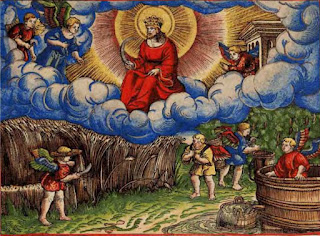
1 John 4:16
And so we know and rely on the love God has for us.
God is love. Whoever lives in love lives in God, and God in them.
Love is a virtue traditionally associated with Christmastime, however love is not only present in a Christian's life during the Christmas season. More than any other virtue; love must abide in a Christian's heart all year long. So, what is "love"?
Perhaps more than any other virtue, the world misunderstands "love". "Love" in the Bible is nothing like what love is in the world, and there is no near equivalent to Biblical "love" in the world to help us understand "love" outside of the Bible. "Love" in the New Testament is ἀγάπη (agapé). Agape is a type of love; a type of affection, benevolence or appreciation for something much like the love the world understands. Agape, though, is not a love found in the world but a "love" all its own. It's so seperate from the world, that according to the Bible Dictionary, it "is rarely used in extrabiblical Greek texts. It was used by believers to denote the special unconditional love of God." This "love" has been made known to humanity through the Word of God and the person of Jesus Christ.
The Bible clearly says that this "love" is not just from God, but that it is God. God is "love." The disciple John wrote to devout believers, "We know and rely on the love God has for us. God is love. Whoever lives in love lives in God, and God in them" (1 John 4:16). John says that those who believe in God rely on Him, and God lives in them. Since God is "love" and only Christians can have God in their hearts, then only Christians can truly "love." With this knowledge we, as believers, know that we are the only people on earth capable of showing true "love," as a demonstration of the "love" God has for us. The "love" God displays for us, and that we can display for each other, is described by Paul in some very famous verses. Paul wrote this of "love" in 1 Corinthians 13:4-7:
4 Love is patient, love is kind. It does not envy, it does not boast, it is not proud. 5 It does not dishonor others, it is not self-seeking, it is not easily angered, it keeps no record of wrongs. 6 Love does not delight in evil but rejoices with the truth. 7 It always protects, always trusts, always hopes, always perseveres.
This is the "love" believers have. This is the "love" God has given us, and He gave this "love" to us in the person of Jesus Christ on the first Christmas. This gift of "love" is powerful. Paul describes that the gift of "love" will not pass away, even after the gifts of knowledge, languages and prophecies all cease (1 Corinthians 13:8). Paul concludes on "love" with the following, "these three remain: faith, hope and love. But the greatest of these is love" (1 Corinthians 13:13).
Paul wrote of what the virture of "love" is, while John wrote of who the person of "love" is. John writes, "This is how we know what love is: Jesus Christ laid down his life for us. And we ought to lay down our lives for our brothers and sisters" (1 John 3:16). God is "love", and God came to us on Christmas, as an act of "love." He laid down His life for us, so that we may know what true "love" is, and that we may show that "love" to the world. The world will wonder and ponder at this until the end of time. It is our mission, as Christians, to point those in the world to what "love" is, so that "love" may abide in the hearts of everyone on earth. We must cry out, "Make way for God," because He is with us. He is here.
Here is our King
Here is our Love
Here is our God who's come
To bring us back to Him
He is the One
He is Jesus, Jesus
-David Crowder Band
Sources
- The Bible (New International Version)
- Bible Hub: Love
- The Bible Dictionary
- David Crowder Band: Here is Our King
























